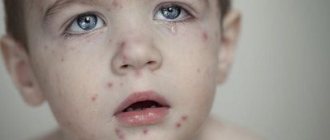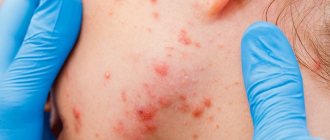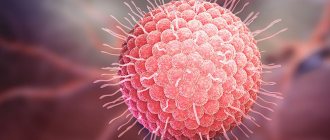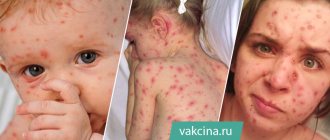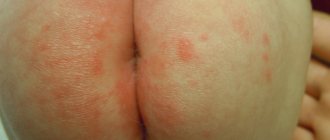Chickenpox - in common parlance, chickenpox is considered more a childhood than an adult disease, which you need to get over once and forget forever, as immunity to this disease is developed. Parents whose children have not yet been ill should be aware of this disease in order to provide the sick child with proper care.
The main sign by which chickenpox is recognized is blisters filled with clear liquid. The rash usually begins from the lower extremities, and within a few hours moves to the top of the head. Most often the disease is accompanied by high fever. It must be remembered that the bubbles that appear on the child’s skin should under no circumstances be squeezed out - scars may remain. Chickenpox is not always accompanied by large rashes; one patient may have from 10 to 50 abscesses, while another child may be covered with them from head to toe. The rash covers not only the skin, but can also form on the mucous membrane of the eyes, on the genitals and even in the mouth. The incubation period for chickenpox is 1 to 3 weeks and is transmitted by airborne droplets over a distance of up to 100 meters. This means that if your child, who was not sick, was in the same room with a chickenpox carrier, know that yours is next.
Chickenpox can be diagnosed by symptoms, without tests or examinations. A child with chickenpox needs home treatment. During the period of rashes, baths should be avoided. Nowadays, just like many decades ago, bubbles are smeared with brilliant green for the purpose of disinfection and drying. As a rule, children from 2 years old experience discomfort on the skin, accompanied by burning and itching. To alleviate the condition, the child is given allergy medications that help reduce itching. Make sure that the child does not scratch the abscesses, this will eliminate the possibility of infection under the skin. In some cases, when an infection occurs, children are prescribed an antibiotic that fights bacteria, but does not affect the course of chickenpox, since it is not effective for viral infections.
Prevention and treatment of chickenpox in children
In recent years, a vaccine has become available that prevents chickenpox infection. The vaccination is effective even after contact with a sick person, the main thing is to have it done within 72 hours. Children are vaccinated against chickenpox from 1 year of age. Immunity lasts for up to 20 years.
It is worth remembering that any disease must be diagnosed correctly and on time. Doctors at our clinic will help you understand the disease and prescribe effective treatment for chickenpox in children . You can make an appointment on this page.
How can you get chickenpox?
Chickenpox, or chickenpox, is a highly contagious infectious disease caused by the Varicella Zoster virus. The disease is characterized by the appearance of an itchy rash. On average, 250–500 papules appear throughout the body, and in severe cases even in the mouth, eyes, anus and genitals.
Because 90% of chickenpox cases occur in children, it is often called a childhood disease. Although adults who did not have chickenpox in childhood can also get sick.
Olga Aleksandrovna Chvertka, a pediatrician at the ON Clinic Poltava [/anchor], talks about possible routes of infection with chickenpox:
“It is quite easy to become infected with chickenpox, and it almost always results from close contact with a sick person. The virus can spread through saliva, sneezing and coughing, and through contact with fluid from blisters. Most often, children under 12 years of age who are actively in contact with peers in kindergarten and school get sick.”
The incubation period can last from 10 to 21 days. In this case, the carrier becomes infectious to the environment several days before the rash appears.
Symptoms
Mild and severe forms of chickenpox are possible. If an infant is mildly ill, the temperature may not rise and the rash may be minor. The biggest concern will be the itching of the rash. In other cases, in addition to blisters on the skin, chickenpox in infants occurs with the following symptoms:
- The child is weak, capricious, turns away from food or does not take the breast. This is due to intoxication.
- Abdominal pain occurs, the baby cries and kicks its legs.
- There is a fever, the typical temperature is from 38 to 40 degrees.
- There is pulsation in the area of the fontanel.
- In severe cases, convulsions and loss of consciousness occur.
If symptoms are observed within 11 days of birth , chickenpox will be considered congenital.
The baby has a fever and may vomit. There is either increased excitability or inactivity. These symptoms last up to two days, after which a rash appears on the skin.
How to recognize chickenpox in a child
Of course, the determining factor that a child has chickenpox is the appearance of a characteristic rash. However, the first symptoms of chickenpox appear even before the formation of red papules. This is what Perelygina Tatyana Sergeevna, pediatrician (m. Pushkinskaya) says:
“The child’s body begins to give the first signals about the activity of the virus several days before the rash. Most likely, your baby will feel general malaise and his appetite will worsen. A cough and an increase in body temperature up to 38 ° -39 ° . In newborns, the onset of chickenpox is often accompanied by poor feeding, tearfulness, and fussiness, so you will immediately notice that the child is restless.”
Naturally, such symptoms are characteristic even of ARVI, so you are unlikely to recognize chickenpox before the formation of papules.
How does chickenpox occur in children?
After the onset of illness, it may take 2-3 days for a rash to appear. Typically, red, itchy papules appear first on the torso, abdomen, scalp and face and then spread throughout the body. During the course of the disease, the rash goes through several stages of development:
- First, small red bumps appear, also called papules;
- then, in place of the cones, blisters filled with liquid form;
- when the blisters burst, fluid leaks out and open sores form on the body;
- During the healing process, the ulcers become covered with a dry crust and disappear over time.
Zharkova Tatyana Sergeevna, pediatric infectious disease specialist at the Medical Center (metro station Sports Palace), notes:
“Since the formation of papules occurs in waves and 3-5 waves of rashes can occur during the course of the illness, often bumps, blisters, open ulcers, and scabs can be seen on the child’s body at the same time. At the same time, the baby remains infectious to others until all the sores are covered with a dry crust.”
How to treat chickenpox in a child
Treatment of chickenpox is predominantly symptomatic. Here's what Tatyana Grigorievna Kirilchuk, pediatrician at the medical ]"ON Clinic Nikolaev"[/anchor] says about this:
“Because chickenpox is a virus, antibiotics are not prescribed. We usually prescribe topicals and antihistamines to relieve the itching. Parents are also advised not to send their child to school or kindergarten to avoid an outbreak of illness among children. Adults who come into contact with the child are also advised to stay home.”
Parents can independently alleviate the child’s condition at home. This will help:
- warm baths. You can add crushed oats to the water, which soothes the skin;
- light, soft clothes. It does not irritate the child’s already itchy skin, and also helps reduce sweating;
- drinking plenty of water. Give your child water to drink; it will help avoid dehydration and help fight the virus faster.
Olga Vasilievna Knizhenko, pediatric infectious disease doctor (metro station Sports Palace), warns:
“Make sure your child does not scratch the rash. A bacterial infection can get into open wounds, which will lead to complications of chickenpox and the appearance of scars.”
Treatment
Chickenpox usually goes away in 7-10 days . The main action during therapy is treatment of the rash to prevent suppuration. Brilliant greens, potassium permanganate, etc. are suitable for this. To relieve unpleasant symptoms, the child may be prescribed antihistamines and antipyretics.
During the course of the illness, it is not recommended to use a washcloth and soap. Dress your child only in soft cotton clothes to reduce itching and the likelihood of rupture of the blisters.
Throughout the entire period of illness, the child is isolated at home, in the children's room. A kindergarten or school is quarantined for three weeks.
What complications can chickenpox have?
If the child is generally healthy, then chickenpox usually progresses in a typical manner: with a rash, a temperature of up to 37.9° and malaise. Complications occur in one case out of 50 and most often affect children with weakened immune systems. A child is at risk of complications from chickenpox if he:
- has a malignant tumor;
- undergoing chemotherapy for cancer;
- treated with corticosteroids;
- has congenital immunodeficiency;
- suffers from HIV.
Thus, among children with leukemia, the mortality rate from chickenpox is 7%. The most common complications from chickenpox are:
- chickenpox pneumonia - usually appears 3-4 days after the first rash;
- encephalitis;
- ataxia - partial or complete loss of coordination. Usually appears 2–3 weeks after the onset of chickenpox;
- secondary bacterial diseases, for example, impetigo (a skin disease in which ulcers appear), fasciitis (inflammation of the fascia - the membrane that covers blood vessels, muscles, internal organs), osteomyelitis (purulent-necrotic damage to the bone, bone marrow and surrounding tissues);
- herpes zoster (herpes);
- Otitis media
Newborns are usually seriously ill with chickenpox. To avoid complications, you should urgently seek advice from a pediatrician or infectious disease specialist if the symptoms increase sharply, the temperature rises, the papules become red and hot, or if the child is dehydrated.
To walk or not to walk?
This is another question in caring for a child with chickenpox that worries parents: is it possible to walk with a baby with chickenpox?
During the period when the child is contagious, walks are not recommended. But if the parents are sure that the baby will not have contact with anyone (for example, if you live in a private house), then you can go for a short walk.
We list the important conditions for walking:
- Body temperature should return to normal.
- The last rash was 7 days ago. Otherwise, if you do go for a walk, there should be no other people on the street, especially children or pregnant women.
- If a child has recently had chickenpox, he should not sunbathe or swim in open water.
- The immune system of a child who has recovered from the disease is still weakened, so he is not recommended to have contact with sick children or unwell adults.
What to do if an adult gets chickenpox
Chickenpox in adults usually develops in the same way as in children and goes away within one to two weeks. Treatment for chickenpox in adults is symptomatic: creams, antihistamines, or pain medications may be needed to relieve the itching and discomfort of chickenpox symptoms. During illness, you should drink a lot of water, rest and not contact people at risk, so as not to infect them.
However, adults, and especially pregnant women and those with weakened immune systems, may suffer from chickenpox in a more severe form than healthy children. In this case, they may be prescribed antiviral drugs. A person with chickenpox should see a doctor immediately if:
- symptoms suddenly worsened;
- the skin around the papules is hot and red;
- there is dehydration;
- chickenpox appeared against a background of weakened immunity (for example, during chemotherapy).
Vaccination is considered the best way to prevent chickenpox in adults, and it is recommended for people at risk:
- health workers;
- those who are in constant contact with people with weakened immune systems (for example, those who have had organ transplants or have HIV);
- teachers and educators;
- travelers.
Women of childbearing age without immunity to chickenpox are also at risk, but there are restrictions for them. If a woman is pregnant or plans to become pregnant in the near future, she should not get the chickenpox vaccine.
A person who has not had chickenpox, but has already been in contact with someone who is sick, can also get vaccinated within three to four days after contact.
The varicella zoster virus remains in the body and usually provides immunity against re-infection with chickenpox. But in adults with weakened immunity, it can reactivate and cause shingles (herpes). This rash usually goes away on its own, but is very painful and can have serious consequences. A common complication is postherpetic neuralgia, that is, damage to peripheral nerves. It is also important to understand that people with shingles can spread chickenpox to others.
Features of the newborn's body
In babies, the body has many characteristics, since it is still actively developing and adapting to new conditions. Chickenpox in newborns is a rare occurrence. Why?
The child’s own immune system is still weak. But all the necessary antibodies that will cope with pathogens of a variety of diseases come to him through mother's milk. It is known that milk has such a protective function for the first six months, and at approximately 6 months the baby’s body begins to independently fight microbes.
Is it possible to prevent chickenpox?
To avoid chickenpox, doctors recommend immunization. The chickenpox vaccine protects a person from the virus in 98% of cases, and in the remaining 2% it makes the course of the disease easier and speeds up recovery.
As an example, we can consider the experience of the United States: mass vaccination against chickenpox began there in 1995. Since then, incidence has dropped by almost 90% and mortality by 66%.
Vaccination takes place in two stages: the first vaccine is administered to children at 12–15 months, and the second at 4–6 years. Older children who have not been vaccinated and have not had chickenpox may also be immunized. To do this, contact your pediatrician, who will create an individual vaccination schedule.
Has your child had chickenpox?
